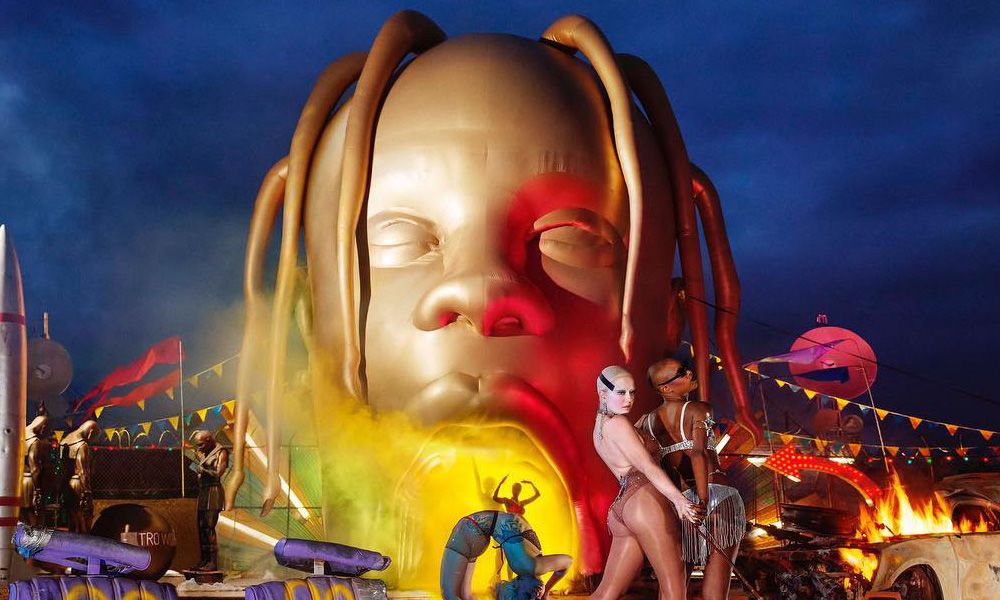Travis Scott releases highly-anticipated ‘ASTROWORLD’

Travis Scott
ASTROWORLD
Epic Records · August 3, 2018
With Astroworld, Travis has crafted a worthy spiritual successor to his debut Rodeo and a thoroughly enjoyable album in its own right.
Having first teased what would become his third album over two years ago, Travis Scott has finally released his highly anticipated Astroworld. It’s named for Six Flags AstroWorld, a former staple of Scott’s hometown of Houston until it was shuttered in 2005. His stated goal for the record was to explore the feeling of having an element as integral to one’s childhood as AstroWorld was to his permanently taken away. Not only is the album is packed with references to his hometown, but Travis also manages to impart that fleeting emotion to the listener. With Astroworld, Travis has crafted a worthy spiritual successor to his debut Rodeo and a thoroughly enjoyable album in its own right.
The opener, ‘Stargazing,’ quickly provides us a microcosm of the rest of the album. A sparse, dark beat gives way to a familiar Travis Scott melody, which is immediately followed by a pitched-up cry for help, readily mixing old with the new. However, disagreements arise arguing how much familiarity is too much: While Travis utilizes recognizable ad-libs and flows on Astroworld, it would be a disservice to the album to assert that they negate the notable fresh elements he incorporates. Inorganic beat switches manufacture a dynamic backbone on several tracks and nearly every feature is utilized excellently. On the whiplash-inducing ‘Sicko Mode,’ Drake adds a tantalizing opener and the penultimate verse. Kid Cudi’s contributions to standout ‘Stop Trying To Be God’ solely consist of hums, but it’s strangely acceptable amid James Blake and Stevie Wonder on harmonica coming together to form this haunting rumination on checking one’s ego.
Travis pulls in plenty of love for his city by collaborating with Houston artists like Wonder and showing respect for legends who preceded him. The utterly smooth ‘R.I.P. Screw,’ pays respects to the late pioneering Houston DJ, while ‘Houstonfornication’ features a contemplative Travis over distorted keys and rumbling bass. Don Toliver’s distinct voice adds another hometown collaboration to the album on ‘Can’t Say,’ nestled amid the stretch of the shortest songs on Astroworld – ‘NC-17’ through ‘Who? What?’ – where we find Travis throwing sonic concepts at the wall. These songs contrast against the album’s more cohesive first half, where the brooding tracks complement one another well. Take exceptional ‘Skeletons,’ which features a brief but welcome appearance from The Weeknd accenting Kevin Parker’s excellent psychedelic production. Parker, better known as the frontman of Tame Impala, has said he hopes to release another album under the Tame Impala name before next June – could his presence here indicate future collaborations between Parker and other rappers on this as-of-yet unannounced project?
Travis, now a father, expectedly references his girlfriend, Kylie Jenner, and daughter on this release. These mentions are sparse beyond ‘Stargazing,’ where he chillingly attributes his daughter’s presence in his life as a catalyst for self-reform. This is rather disappointing given the album’s potential for a broader attempt at an exploration of maturity, but is mitigated by the closer ‘Coffee Bean,’ which features loose rapping reminiscent of Kanye West’s on ‘30 Hours’ over laid-back Nineteen85 production. It’s a rare glimpse into Scott’s personal life and it works well, even if his overall treatment of his fatherhood mirrors Drake’s approach on Scorpion.
On the third track, Travis boasts, “Who put this shit together? I’m the glue.” He certifies this assertion by pairing top-notch production with great contributions from him and a cast of features that even pick up the slack from Travis should he falter. To those that dismiss him for his rapping ability, he reminds them that since Days Before Rodeo he hasn’t billed himself as a top lyricist. Rather, he plays to different strengths and with Astroworld has successfully crafted an impressive album that will be appreciated by many for a long time to come.